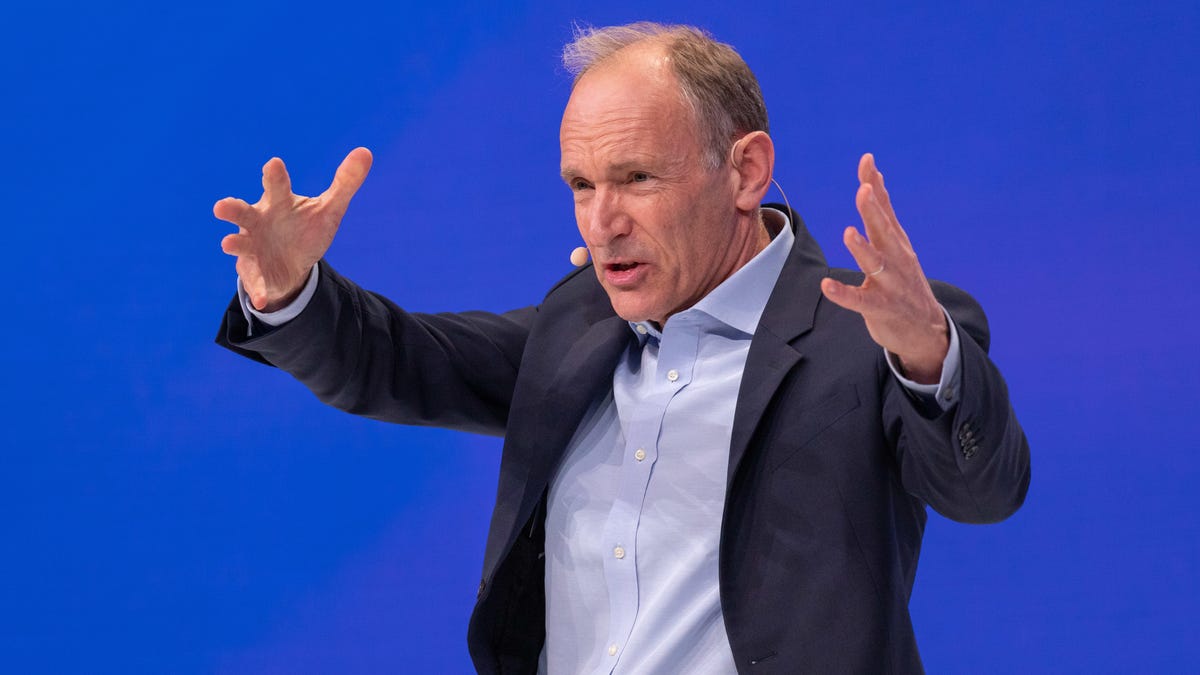Web inventor worries profit priorities could taint .org domain
Tim Berners-Lee says selling .org operations to Ethos Capital could be a "travesty." Ethos says jacking up prices isn't its plan.

World Wide Web inventor Tim Berners-Lee speaks at the Oktane 2019 conference.
Web inventor Tim Berners-Lee is worried that a for-profit company plans to buy the organization that administers the .org internet addresses used by millions of nonprofit organizations.
On Nov. 13, the Internet Society, a nonprofit devoted to increasing the internet's reach, security and privacy, announced a plan to sell the .org oversight role to investment firm Ethos Capital by the first quarter of 2020. The Internet Society's Public Interest Registry (PIR) sells nonprofit organizations the right to use .org domains, but if the sale is completed, that work would move to Ethos.
Ethos promised to "uphold PIR's core founding values" and is "committed to keeping .org accessible and reasonably priced for all." But Berners-Lee isn't assured.
"I'm very concerned about the sale of .org to a private company," Berners-Lee tweeted Wednesday. "If the Public Interest Registry ends up not being required to act in the public interest, it would be a travesty. We need an urgent explanation."
And the Electronic Frontier Foundation, an online rights organization, raised the specter of censorship and price increases and launched a petition to stop the sale of the .org operations. It's worried that cash-strapped nonprofits could be forced to move to a different internet domain that doesn't carry the brand value of .org.
Silicon Valley, and indeed much of the internet, has become successful thanks largely to companies backed by venture capital. But today, there's new attention on the downside of these enterprises. Difficult working conditions in Amazon order fulfillment centers, political manipulation on Facebook's social network and the military use of Google technology are emblematic of a skepticism about unfettered capitalism.
Ethos plans to encourage growth in the .org operations, but didn't share specifics beyond saying it's "enthusiastic about developing new services and support to serve the .org community."
Ethos Capital didn't immediately comment on Berners-Lee's concern, and the Internet Society didn't immediately respond to a request for comment.
But Nora Abusitta-Ouri, Ethos' chief purpose officer, argued in a blog post that "doing 'well' and doing 'good' are not mutually exclusive."
"I am fascinated by the challenges organizations face as they navigate the balance between the typical metrics of success, such as financial growth and profitability, with socially responsible initiatives -- which many (myself, included) argue are equally as important," she said.
And Richard Barnes, an Internet Society board member who works at networking giant Cisco and the Let's Encrypt effort to make secure internet connections easier to obtain, defended the .org operations sale in a blog post Tuesday. He pointed out that the .org manager must give six months' notice of any price increase, at which point an organization can lock in a 10-year contract at existing prices.
".org is going to be just fine," Barnes said.
Originally published Nov. 27, 3:31 p.m. PT.
Update, 3:53 p.m. PT: Adds comment from Ethos' Nora Abusitta-Ouri.

